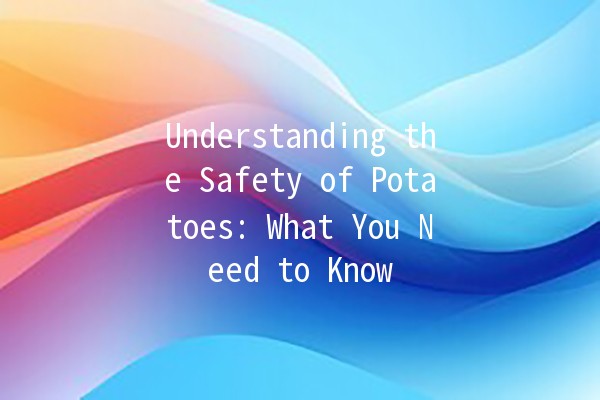to Potato Safety
Potatoes are a staple food in many cultures across the world. They are nutritious, versatile, and can be prepared in numerous ways. However, like any food item, there are safety considerations to keep in mind. Understanding the safety aspects of consuming potatoes, especially in the context of Chinese cuisine and handling practices, is crucial.
The Nutritional Value of Potatoes
Before diving into safety concerns, it's essential to recognize the nutritional benefits that potatoes offer. They are rich in vitamins C and B6, potassium, and dietary fiber, making them a valuable addition to any diet. Potatoes can help regulate digestion, provide energy, and support overall health when prepared healthily.
Common Concerns Regarding Potato Safety
One of the most widely discussed safety issues regarding potatoes is solanine, a natural toxin that can be harmful if consumed in large quantities. Solanine is produced in the green parts of the potato, including the skin and any sprouted areas. When potatoes are exposed to light, they can turn green, and the concentration of solanine increases.
Tip: Always store potatoes in a cool, dark place to prevent greening. If you find green areas or sprouts, cut them away before cooking to minimize risk.

In some regions, potatoes may be treated with pesticides during their growth. These residues can remain on the surface of the potatoes, potentially posing health risks if not removed.
Tip: To ensure safety, always wash potatoes thoroughly under running water before cooking. Peeling them can also help reduce exposure to pesticides and contaminants.
Like all agricultural products, potatoes can be contaminated with harmful bacteria such as Salmonella or E. coli during handling and transportation. This contamination can be minimized through proper hygiene practices and cooking.
Tip: Always wash hands, utensils, and surfaces before and after handling potatoes. Cook potatoes to an internal temperature of at least 165°F (74°C) to kill any bacteria that may be present.
While rare, some individuals may have allergic reactions to potatoes. Symptoms can range from mild to severe, including skin rashes, stomach cramps, or even anaphylaxis.
Tip: If you experience unusual symptoms after consuming potatoes, consult with a healthcare professional for advice.
Improper preparation and cooking methods can also lead to food safety concerns. Undercooked potatoes can be tough and hard to digest, while overcooking can lead to nutrient loss.
Tip: Always follow cooking instructions, and use appropriate cooking methods such as boiling, baking, or frying to ensure the best results.
Practical Tips for Handling Potatoes Safely
Tip 1: Proper Storage Techniques
To ensure the safety and longevity of your potatoes, store them in a cool, dark, and dry place. Avoid storing them with onions, as this can cause premature sprouting.
Tip 2: Washing and Peeling
Before cooking, always wash potatoes thoroughly to remove any dirt or pesticide residues. If pesticide use is a concern, consider peeling the potatoes to eliminate surface residues.
Tip 3: Cooking Thoroughly
Cooking potatoes thoroughly can kill any harmful bacteria. Ensure they reach a temperature of at least 165°F (74°C) to minimize the risk of foodborne illnesses.
Tip 4: Monitoring for Green Spots
Regularly check your potatoes for any green spots or sprouts. If you see any, cut them away before cooking. If the potato is extensively green or sprouted, consider discarding it.
Tip 5: Safe Consumption Practices
Pay attention to expiration dates and buy potatoes from reputable sources. Trustworthy vendors typically adhere to safety standards, providing you with fresher, safer produce.
Frequently Asked Questions about Potato Safety
Green potatoes can contain solanine, which is toxic if consumed in large quantities. If the potato is slightly green, cut away the green parts before cooking and consuming it. However, if the potato is extensively green, it is safer to discard it.
Bad potatoes may have a foul odor, excessive softness, or visible mold. If you notice any of these signs, it's best to discard the potato to avoid any health risks.
Organic potatoes are typically grown without synthetic pesticides, which may reduce the risk of pesticide residues. However, it is still crucial to wash all potatoes thoroughly before consumption, regardless of whether they are organic or conventional.
If you experience symptoms such as stomach pain, nausea, or allergic reactions after eating potatoes, seek medical attention. An allergic reaction can be serious and requires prompt care.
Eating raw potatoes is not recommended, as they may contain solanine and can be difficult to digest. Cooking potatoes thoroughly makes them safer and easier to digest.
Store cooked potatoes in an airtight container in the refrigerator and consume them within 34 days. Be sure to reheat them to a safe temperature before eating.
Understanding and implementing safe practices regarding potato consumption is essential for health and wellbeing. Whether you enjoy mashed potatoes, fries, or baked varieties, following these tips will help ensure that your favorite dishes are safe and nutritious. Remember to stay informed, wash your potatoes, and cook them thoroughly to enjoy all the benefits this versatile food can offer!